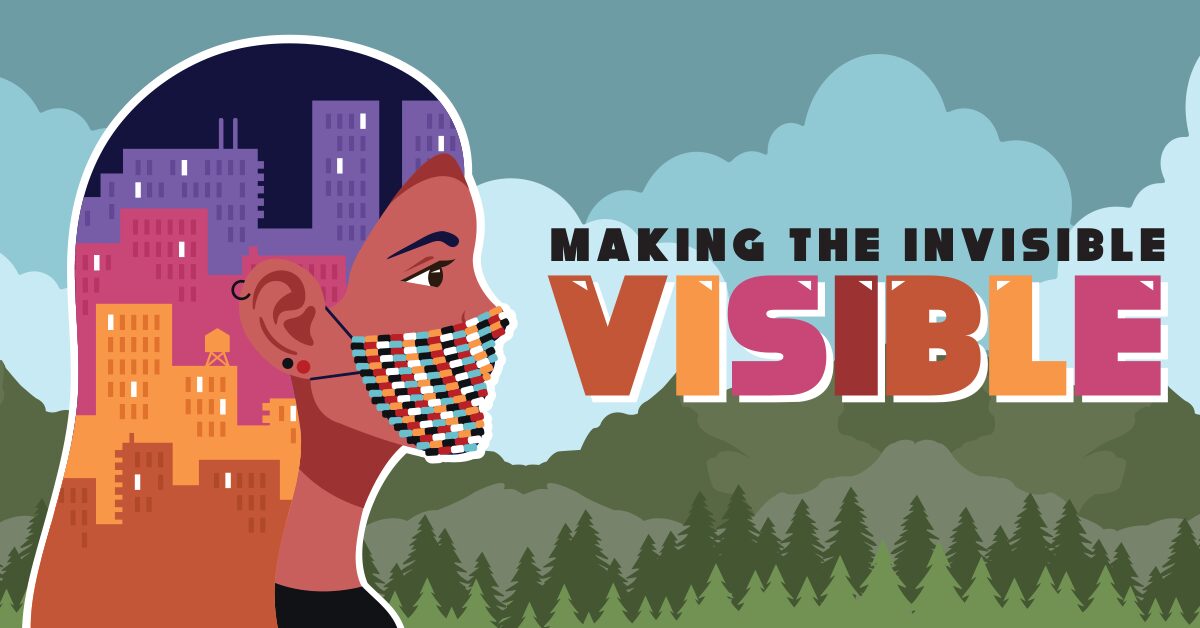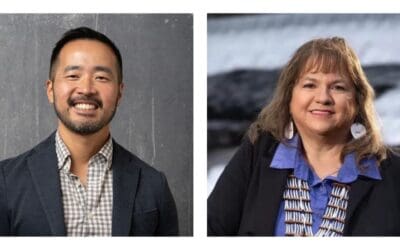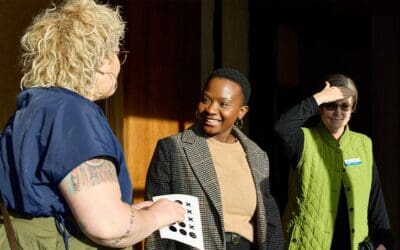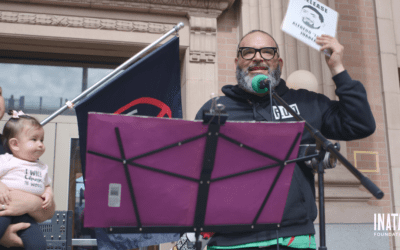Until Feb. 1, 2023, we were Group Health Foundation. This post was written under our former identity. To learn more about our new name, read our announcement here.

Group Health Foundation granted more than $1 million to assist 17 tribal nations and organizations with 2020 Census outreach. Grantees work in and with communities who have been systemically undercounted. We supported the National Urban Indian Family Coalition’s strategy in Washington State.
Janeen Comenote has spent the better part of her career dismantling the notion that Native people are not a powerful constituency.
“Native people are made invisible by design,” she said. “I’ve worked nationally, with all different types of people, and it was surprising how even other people of color don’t know anything about us. And maybe it’s not surprising when you remember that America doesn’t want to think about the attempted genocide on Native people, and that we survived. I’m a direct descendant of someone who survived.”
Janeen, who grew up in Washington State and graduated from West Seattle High School, is the founding executive director of the National Urban Indian Family Coalition (NUIFC), based in Seattle. She is Quinault and Oglala on her father’s side and on her mother’s side, Hesquiaht and Kwakiutl First Nations. The coalition works to sustain Indigenous values and culture, and nationally elevate voices of American Indians and Alaska Natives living in urban areas.
Census undercounting is one way Native people have been systemically invisibilized. Reports explaining the undercounts describe Native people as “hard to reach” because they live in rural areas or their home addresses change frequently. To Janeen, these are just excuses to not implement easy fixes.
One solution is allowing tribes to supplement census data with tribal roll information. “Tribal governments know where every tribal member is, both on and off the reservation,” said Janeen, adding that tribal communities should also receive adequate resources to reach people wherever they are. Another idea is folding the census into other government services, such as public school enrollment or driver license renewal. “We have the money to do all of this, what we don’t have is the political will.”
In the broader discourse about undercounting, less consideration is given to history. Many Native people do not trust the federal government, an institution that has long inflicted trauma on—and reneged on agreements with—tribal communities.
For the 2020 Census, there’s even less reason for trust. The current presidential administration, amid a pandemic and against expert recommendations, is attempting to move the self-reporting deadline a month early to Sept. 30, which would guarantee an undercount of Native and other historically undercounted communities.
Janeen understands the distrust. She also believes the census is critical to reclaiming power for Native communities. There is a lot at stake with the census. It’s the United States’ statistical backbone, providing key demographic data that nonprofits, businesses, and other entities reference for decision-making. The federal government also uses census data to distribute $1 trillion in funding for public services such as transportation, education, and health care, and to draw district lines that affect seats from local school boards to the United States Congress.
While engaging with policymakers in its early years, the NUIFC realized that not only did people have a lack of knowledge about Native people, they especially did not know anything about Native people living in urban areas. “It was shocking how many people, including members of our government, thought that all Native people live on reservations,” Janeen said. In an effort to educate lawmakers, the coalition spent three years hosting policy roundtables in 11 cities. “If you don’t have information about what is impacting a community, it’ll be really hard to address it.”
These early conversations are now informing the coalition’s 2020 Census campaign, “Making the invisible, visible.” The NUIFC is currently funding 20 urban Native organizations in 18 cities to do census outreach. Eight are Washington nonprofits serving Seattle, Spokane, Vancouver, and in-lieu fishing sites along the mid-Columbia River.
“Nonprofits are tribal embassies in cities,” Janeen noted, adding they are trusted community organizations who are instrumental to the census count. “For Native people living in mid-size and large cities, these places offer more than just services; they are cultural touchstones within the urban diaspora for Indigenous people.”
The NUIFC had been planning its 2020 Census work for years. What they didn’t anticipate—like everyone else—was the COVID-19 pandemic. In-person gatherings like powwows were critical to Native outreach efforts, but the work came to a standstill once shelter-in-place orders were issued.
Organizations turned their attention to the immediate needs of the health and economic crisis, and many didn’t start census work back up again until June. “We contacted our census grantees and told them we understand that they might not be able to carry out their proposals and we encouraged them to do the best they could,” Janeen said. “We saw some pretty creative things.”
Some organizations adapted to current realities by hosting virtual events, including a dance contest and bingo nights. Others folded census outreach into the work they were already doing, such as making it part of their home visiting programs, food basket distribution at community pantries, and enrollment in preschool programs.
The NUIFC also added more flexible terms to their grants, allowing nonprofits to use funds for voter engagement and power-building with other local communities of color. “We have more power when we come together and we are better together,” Janeen said. “A great example is the Coalition of Communities of Color in Portland, where they systemized coalition work with some incredible results.”
Voting is another form of civic power that has historically shut out Native people, Janeen added. “When you live in a system that has repeatedly made you invisible to the power of that system, it creates a general apathy about the system. People legitimately don’t believe their votes count anymore,” she said.
But Janeen sees a paradigm shift coming. While the census count may not go as planned this year, Native people are increasingly harnessing their electoral power. She pointed to the election of Lt. Gov. Peggy Flanagan in Minnesota, and U.S. representatives Deb Haaland in New Mexico and Sharice Davids in Kansas as evidence.
These Native leaders are catalysts, said Janeen, adding, “When you have someone who speaks for you and your community, you’re going to vote.”
To learn more about the National Urban Indian Family Coalition, visit their website or follow them on Facebook, Twitter, and Instagram. Illustration by Danny Ramirez.



